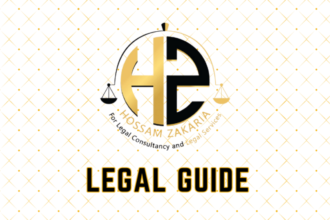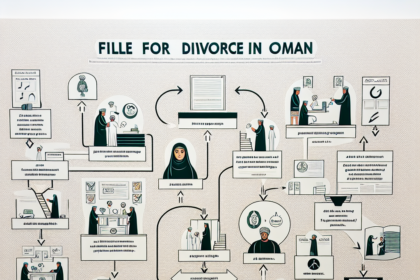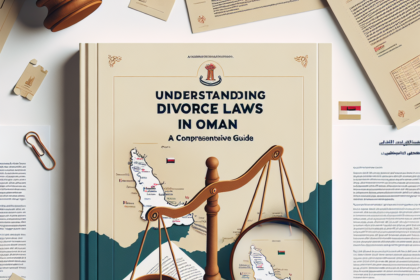Tag: Divorce Laws and Procedures in Oman
Introduction
Divorce is a significant legal process that dissolves a marriage and addresses the distribution of assets, custody of children, and financial support. In Oman, divorce laws are influenced by Sharia (Islamic law), which governs family matters. This comprehensive guide provides an in-depth look at the divorce laws and procedures in Oman, covering legal grounds, processes, custody issues, financial implications, and more. Understanding these aspects can help individuals navigate the complexities of divorce in Oman effectively.
Chapter 1: Legal Framework for Divorce in Oman
1.1 Sources of Divorce Law
Divorce in Oman is primarily governed by:
- Sharia (Islamic Law): The primary source for family law matters, including marriage and divorce.
- Personal Status Law: Codified in the Omani Personal Status Law of 1997 (Royal Decree No. 32/97), which provides specific regulations for divorce and related issues.
- Civil Court System: Handles the legal proceedings and enforcement of divorce decrees.
1.2 Principles of Sharia Law
Sharia law, derived from the Quran and Hadith, emphasizes justice, fairness, and the welfare of the family. Key principles include:
- Rights and Duties of Spouses: Mutual respect, financial support, and fidelity.
- Grounds for Divorce: Recognizes several valid grounds for divorce.
- Custody and Support: Focus on the best interests of children and fair financial support for spouses.
Chapter 2: Grounds for Divorce
2.1 Talaq (Repudiation)
- Definition: The husband’s unilateral right to divorce by pronouncing “talaq” (I divorce you) three times.
- Conditions: Must be pronounced in clear terms, either all at once or separately.
- Waiting Period (Iddah): A mandatory waiting period of three menstrual cycles for the wife to ensure she is not pregnant, allowing for reconciliation.
2.2 Khula (Divorce by Mutual Consent)
- Definition: A divorce initiated by the wife in exchange for financial compensation to the husband.
- Conditions: Both parties must agree on the compensation, and the husband must consent to the divorce.
2.3 Judicial Divorce (Faskh)
- Definition: A divorce granted by the court based on specific grounds.
- Grounds for Faskh:
- Cruelty or Abuse: Physical or emotional harm by the spouse.
- Desertion: Abandonment by the spouse for a specified period.
- Failure to Provide: Inability or refusal to provide financial support.
- Impotence or Infertility: Inability to consummate the marriage or produce offspring.
2.4 Other Grounds
- Mutual Agreement: Both spouses agree to end the marriage without court intervention.
- Irretrievable Breakdown: The marriage has broken down beyond repair, though this is less common in Omani law compared to other jurisdictions.
Chapter 3: Divorce Procedures
3.1 Filing for Divorce
- Initiating the Process: The spouse seeking divorce files a petition with the Sharia court.
- Required Documents:
- Marriage Certificate: Proof of the marriage.
- Identification Documents: National ID or passport copies.
- Grounds for Divorce: Evidence supporting the grounds for divorce (e.g., medical reports, witness statements).
3.2 Court Proceedings
- Initial Hearing: The court schedules a hearing to review the petition and evidence.
- Reconciliation Attempts: The court may require attempts at reconciliation, often involving family or community mediators.
- Subsequent Hearings: Further hearings may be needed to present additional evidence and testimony.
3.3 Final Decree
- Issuance of Decree: If the court is satisfied with the grounds for divorce, it issues a divorce decree.
- Waiting Period: The iddah period must be observed before the divorce is finalized.
- Registration: The divorce decree is registered with the relevant civil authorities.
Chapter 4: Custody and Child Support
4.1 Custody Arrangements
- Primary Considerations: The best interests of the child, including age, gender, and parental capacity.
- Mother’s Custody: Typically granted to the mother for young children, especially daughters.
- Father’s Custody: Fathers are more likely to receive custody of older boys.
4.2 Visitation Rights
- Non-Custodial Parent: Entitled to reasonable visitation rights, which can be specified in the court order.
- Supervised Visitation: May be ordered in cases where the child’s safety is a concern.
4.3 Child Support
- Financial Responsibility: The non-custodial parent, usually the father, is required to provide financial support for the child’s upbringing.
- Calculation of Support: Based on the father’s income and the child’s needs, including education, healthcare, and general living expenses.
- Enforcement: Court-ordered support payments are enforceable by law, with penalties for non-compliance.
Chapter 5: Financial Implications of Divorce
5.1 Alimony (Nafaqa)
- Definition: Financial support provided by the husband to the wife during and after the marriage.
- Calculation: Based on the husband’s income and the wife’s needs.
- Duration: Typically lasts for the iddah period or longer if the court deems necessary.
5.2 Division of Property
- Marital Property: Assets acquired during the marriage are subject to division.
- Separate Property: Assets owned before the marriage or received as gifts or inheritance remain with the original owner.
- Distribution: Equitable distribution based on contributions and needs, as determined by the court.
5.3 Dower (Mahr)
- Definition: A mandatory gift from the husband to the wife, specified in the marriage contract.
- Payment: The unpaid portion of the mahr must be paid upon divorce.
- Purpose: Provides financial security for the wife post-divorce.
Chapter 6: Mediation and Counseling
6.1 Role of Mediation
- Purpose: To facilitate reconciliation or amicable settlement between the spouses.
- Process: Involves family members, community leaders, or professional mediators.
- Outcomes: Can result in reconciliation, mutual agreement on divorce terms, or improved communication.
6.2 Counseling Services
- Availability: Provided by religious institutions, social services, and private practitioners.
- Focus: Addressing marital issues, emotional support, and guidance on legal processes.
- Effectiveness: Can help reduce conflict and promote understanding between spouses.
Chapter 7: Legal Representation and Advice
7.1 Importance of Legal Counsel
- Navigating Complexities: Understanding the intricacies of Sharia and Omani law.
- Protecting Rights: Ensuring fair treatment and protecting legal rights.
- Document Preparation: Assisting with the preparation and submission of legal documents.
7.2 Choosing a Lawyer
- Qualifications: Look for experience in family law and understanding of Sharia.
- Reputation: Seek recommendations and reviews from previous clients.
- Communication: Choose a lawyer who communicates clearly and regularly.
7.3 Costs of Legal Services
- Fee Structures: Hourly rates, flat fees, or retainer agreements.
- Financial Assistance: Some legal aid organizations provide support for those who cannot afford private counsel.
Chapter 8: Post-Divorce Considerations
8.1 Enforcement of Court Orders
- Compliance: Ensuring adherence to custody, support, and property division orders.
- Legal Recourse: Options for addressing non-compliance, including court intervention and enforcement actions.
8.2 Modification of Orders
- Changing Circumstances: Orders can be modified due to significant changes in circumstances, such as income changes or relocation.
- Court Approval: Modifications must be approved by the court to be legally binding.
8.3 Re-Marriage
- Waiting Period: Women must observe the iddah period before remarrying.
- Legal Requirements: New marriage contracts must comply with Omani law and Sharia principles.
Chapter 9: Impact on Children
9.1 Emotional and Psychological Effects
- Adjustment Period: Children may experience emotional and psychological challenges during and after divorce.
- Support Systems: Importance of maintaining strong support networks, including family, friends, and counseling services.
9.2 Parental Responsibilities
- Co-Parenting: Importance of cooperation and communication between parents for the child’s well-being.
- Stability and Consistency: Providing a stable and consistent environment for the child.
9.3 Legal Protections
- Best Interests of the Child: Courts prioritize the best interests of the child in custody and support decisions.
- Child Advocacy: Legal provisions for child advocacy in contentious cases.
Conclusion
Divorce laws and procedures in Oman are deeply rooted in Sharia principles and the Omani Personal Status Law. Navigating these legal processes requires a thorough understanding of the grounds for divorce, procedural requirements, custody and support considerations, and financial implications. This comprehensive guide serves as a valuable resource for individuals seeking to understand and navigate the complexities of divorce in Oman, ensuring informed decision-making and adherence to legal standards.
FAQs
- What are the primary grounds for divorce in Oman?
- Grounds include talaq (repudiation), khula (mutual consent), and judicial divorce (faskh) based on cruelty, desertion, failure to provide, or impotence.
- What is the iddah period in Omani divorce law?
- The iddah period is a waiting period of three menstrual cycles for the wife, ensuring she is not pregnant and allowing for reconciliation.
- How is child custody determined in Oman?
- Custody is based on the best interests of the child, typically granting mothers custody of young children and fathers custody of older boys.
- What financial support is available to a wife after divorce in Oman?
- Financial support includes alimony (nafaqa), division of marital property, and payment of the dower (mahr).
- Can divorce orders be modified in Oman?
- Yes, orders can be modified due to significant changes in circumstances, such as income changes or relocation, with court approval.
By understanding these aspects of divorce laws and procedures in Oman, individuals can better navigate the legal landscape and ensure they operate within the bounds of the law.




